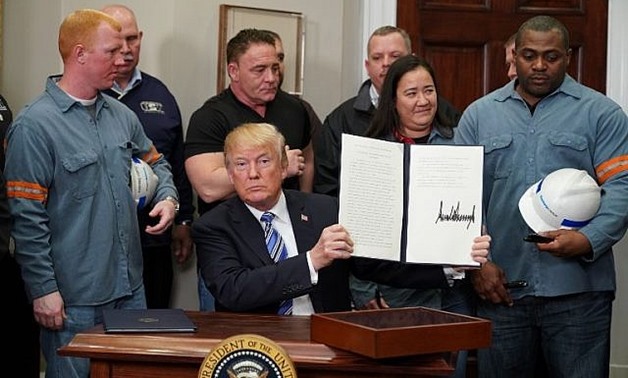
US President Donald Trump signs Section 232 Proclamations on Steel and Aluminum Imports in the Oval Office of the White House on March 8, 2018, in Washington, DC. ( AFP PHOTO / Mandel NGAN)
UNITED STATES - 10 March 2018: Key US trading partners on Friday condemned President Donald Trump's decision to slap punitive tariffs on foreign steel and aluminium as "protectionism" and an affront to allies, as fears grew of a global trade war.
Chancellor Angela Merkel of Germany, Europe's biggest economy and NATO ally, urged dialogue and warned that "no one can win in such a race to the bottom".
Berlin backs the European Union in "seeking dialogue with the United States, but also with countries that could be affected, like China," she said.
Earlier, German Economy Minister Brigitte Zypries said: "This protectionism is an affront to close partners like the European Union and Germany and limits free trade."
The EU has threatened retaliatory tariffs on items from steel to peanut butter, bourbon and denim -- most of which are produced in states that Trump needs to win to be re-elected.
"We are prepared and will be prepared if need be to use rebalancing measures," European Commission Vice President Jyrki Katainen told reporters in Brussels.
The top EU trade official Cecilia Malmstroem said the entire bloc, as a "close ally" of the US, "should be excluded" from the tariffs, and vowed to "seek more clarity" from Washington.
Condemnation also rained in from elsewhere, with the world's second-biggest economy China deriding the tariffs of 25 percent on imported steel and 10 percent on aluminium as "a serious attack on normal international trade order".
Close US ally Japan warned the levies "could have a grave impact on the economic relationship" between the world's top and third-largest economies.
- 'Real friends' -
In a sharp reversal from decades of a US-led drive towards more open trade, Trump declared on Thursday that America had been "ravaged by aggressive foreign trade practices".
"It's really an assault on our country," he blasted, announcing the tariffs on the metals used in everything from cars to construction, roads to railways.
Trump said the tariffs -- which will come into effect after 15 days -- will not initially apply to Canada and Mexico, and that close partners on security and trade could negotiate exemptions.
Canada was the largest US source of steel last year, followed by Brazil, South Korea, Russia, Mexico, Japan and Germany.
The US neighbour to the north was also by far the largest supplier of alumina and aluminium, followed by China, Russia and the United Arab Emirates.
Trump had indicated he would be flexible towards "real friends," and during the signing confirmed Canada and Mexico would be exempted permanently if the ongoing renegotiation of the North American Free Trade Agreement is successful.
But both Mexico and Canada rejected Trump's linkage of the levies to ongoing NAFTA talks.
Canada's Foreign Minister Chrystia Freeland termed the two things "separate issues" while Mexico's economy ministry said "the negotiation of the NAFTA should not be subject to conditions outside the process".
The US leader had also added Australia to a list of likely carve-outs, describing it as a "great country".
- 'All necessary steps' -
However, he took aim at Germany, reviving a longstanding gripe that European NATO allies do not pay their fair share.
"Many of the countries that treat us the worst on trade and on the military are our allies, as they call them," he complained, even as Merkel said Germany and the EU would seek exemption from the punitive tariffs.
Elsewhere, Brazil and Britain were also quick to launch broadsides against the tariffs, which are worth billions of dollars.
Britain blasted the tariffs as "not the right way" to tackle the problem of global overcapacity in steel while major producer Brazil immediately vowed to take "all necessary steps" in order to "protect its rights and interests".
South Korea said it would consider taking the case to the World Trade Organization if Washington refuses to exempt it from the tariffs.
But dispute cases can take three years to resolve, and there is nothing stopping countries from imposing tit-for-tat trade restrictions while the legal process plays out.
- Off the cuff -
Last week Trump stunned the world -- and his own aides -- with an off-the-cuff announcement of his plan, even before White House lawyers judged the legality of the tariffs.
Trump said he was merely fulfilling a campaign promise, saying he had been talking about perceived trade injustices "a long time, a lot longer than my political career".
While the full economic impact remains unknown, the political fallout at home was swift with the top Republican in Congress Paul Ryan publicly denouncing Trump's move, and top economic advisor Gary Cohn resigning in protest.
Even as Trump approved the tariffs, 11 partners in the Asia-Pacific were in Santiago, Chile, to sign a trade deal embraced by Barack Obama but rejected by Trump.
Global markets were buoyed by the news that Trump would meet North Korean leader Kim Jong Un, but uncertainty surrounding the trade row kept a lid on gains.


Comments
Leave a Comment